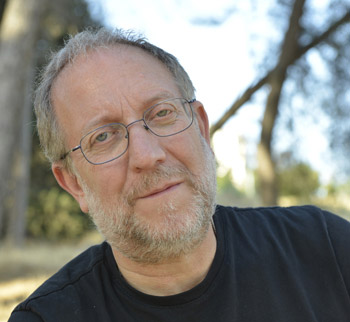The recent 40th anniversary of the Yom Kippur War prompted a great deal of soul searching in the Israeli body politic, with left and right seeking to understand the “sin” that led to the disastrous war, according to author and journalist Yossi Klein Halevi.
The lessons of that war in 1973 have relevance to today, Halevi said, though each wing of the Israeli political spectrum drew different lessons from the conflict, and hence, different ways of atoning for those sins.
For the left, the sin was one of Israeli hubris and overconfidence; for the right, it was forgetting that the country resided in the middle of a dangerous neighbourhood with enemies pledged to its demise, he said.
Israelis are currently facing a situation with similar perils. Iran continues to build its nuclear program, and the Israeli political leadership, like prime minister Golda Meir in 1973, must decide whether to launch a pre-emptive strike to destroy it, or at least set back its progress.
In 1973, Meir could have ordered an air strike on Egyptian and Syrian forces preparing to attack. She did not do so, she later explained, because she was worried that such a course would anger the United States and isolate Israel. In the end, Israel absorbed the Arab attack and suffered a large number of casualties, but received much-needed aid from the United States in the midst of the war.
Today, Prime Minister Benjamin Netanyahu faces a similar situation, with Iran standing-in for Egypt and Syria. Israel has months, not years, to decide whether to launch a strike against Iranian nuclear installations, Halevi stated.
Speaking at a media briefing in Toronto sponsored by the Centre for Israel and Jewish Affairs (CIJA), Halevi said that, for Israel, “the window is closing for an effective pre-emptive strike.”
Iran is in the midst of negotiations with western nations, but the talks are moving along much too slowly for Israel’s liking, he said. “It’s that leisurely process that drives Israelis crazy.”
To Israelis, the West appears “depleted and looking for a way out,” Halevi said.
The United States appears exhausted and suffering from “a self-willed naivete.” And President Barack Obama’s “red line” cannot be trusted.
“Israelis are deeply worried over Obama’s wavering and self-imposed humiliation [over Syrian red lines], and the inability to use American power responsibly against a regime practising auto-genocide,” he said.
That vacillation “has had a profound impact on the Israeli reading in terms of where we are on Iran,” he added.
If Israel strikes unilaterally, it will find itself truly alone. On the other hand, failure to address a truly existential threat would raise profound questions in Israel as to whether the state “still has what it takes to survive in the Middle East.” It would lead Israelis to question whether Jewish sovereignty is temporary or permanent, he said.
Halevi, who recently authored Like Dreamers: The Story of the Israeli Paratroopers who Reunited Jerusalem and Divided A Nation , said a successful mission might only set back Iran’s nuclear program a few years. Nevertheless, much could happen in that time, including a revival of the Green Revolution against the current religious leadership.
Israel’s policy vis-à-vis Iran has been linked to the Palestinian issue for 20 years, he continued. Former prime minister Yitzhak Rabin opened negotiations with the Palestinians in the long-term hope he could “neutralize the Palestinian issue and focus on Iran as the number 1 existential threat.”
The failure of the peace process and the onset of “the worst reign of terror in our history” – after Israel made two offers for a two-state solution – has led the current generation of Israelis to take a more hardline position than his generation, which felt guilty at not solving the Palestinian question after the first intifadah.
The current generation feels no guilt over the occupation. They see it as something the Palestinians have brought upon themselves. The main issue for them isn’t the absence of a Palestinian state, but the existence of a Jewish one.
In a question period, Halevi said that contrary to stereotypes, Israel is becoming more pluralistic as haredi influence wanes. He pointed to the government’s determination to provide an egalitarian place for prayer at the Western Wall as an important example.
Moreover, “the majority of Israelis have finally taken matters in hand and insisting the absurd situation in which the ultra-Orthodox separate from society, don’t fulfil their obligations [while] the rest of us subsidize it, that’s ending.”
He suggested that the haredi lifestyle was unsustainable and that young people from that segment of the population increasingly want to be part of the larger Jewish society.
Meanwhile, other young Israelis are turning to Judaism and “experimenting” in non-traditional forms of the faith, even finding expression in spiritual rock music, he said.
Halevi suggested the Israeli government ought to offer Palestinians living in Jerusalem the option of acquiring Israeli citizenship. “My sense is that many Palestinians in the Jerusalem area would go for that deal,” he said.
And he cautioned that any evacuation of the 100,000 or more Israelis living in settlements beyond the security barrier could cause tremendous division. It could lead to civil war and tear the army apart, he said.
